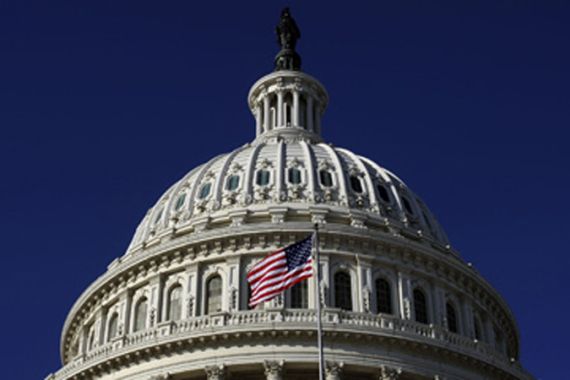US congress holds lame-duck session
Session between November elections and new congress in January to focus on tax cuts and government spending.

 |
| November’s midterm elections saw Obama’s Democratic Party lose majority in the House of Rpresentatives [Reuters] |
The US congress is holding a post-election meeting called a “lame-duck session” that is likely to focus mainly on government spending, tax cuts and a landmark nuclear treaty with Russia.
A lame-duck period comes between the congressional election in November and the start of the new congress in January. During this time, congress can be in session but operates with many legislators just voted out of office and with none of the newly elected members, except victorious incumbents.
Keep reading
list of 4 itemsEcuador weighs security, international arbitration in latest referendum
‘Triple spending’: Zimbabweans bear cost of changing to new ZiG currency
Boeing hit with 32 whistleblower claims, as dead worker’s case reviewed
Nancy Pelosi, the House of Representatives speaker, and her fellow Democrats will close out a four-year hold on power, following the midterm election results, that put Republicans in charge of the chamber.
The senate will continue to be controlled by Democrats but they will hold a smaller majority.
The lame-duck session is a time to try to complete action on long-stalled bills. It could also be a preview of how Democrats and Republicans will interact next year.
The session will continue for a week or so, starting on Monday, and then break on November 25. It is expected to then continue through early December.
Tax cuts
Broad tax cuts enacted when George Bush was president expire at the end of 2010. Most Republicans and some Democratic legislators want to extend most, if not all, of them.
 |
|
US budget deficit currently stands at over $14 trillion – that equals to nine per cent of the country’s GDP [AFP] |
Barack Obama, the US president, and Republicans have put this issue at the top of their agenda for the lame-duck session.
Initially Obama proposed extending the tax cuts for people making up to $200,000 and families earning up to $250,000 a year. Earners above those levels would go back to paying higher taxes.
Republicans want all of the cuts extended permanently. Both plans would add to already large US budget deficits, although the Republican plan would cost the government more.
Since the elections, Obama has taken a step towards the Republicans, signalling a willingness to extend the high-income tax cuts temporarily, while making the rest permanent.
If the parties cannot agree on a short-term plan, the tax cuts will run out on December 31, but the new Republican-heavy congress convening in January would likely reintroduce them immediately.
If there is progress during the lame-duck session, some other tax law extensions could be folded in. Those include incentives to encourage ethanol, wind and solar energy.
Priorities set out
The other high priority of the lame-duck session will be passing legislation to fund a range of government programmes. Currently, there is only enough money approved by law to keep federal agencies operating through December 3.
| Talking Points | |||||||||
|
Without the additional funding, federal law enforcement, education, agriculture, space exploration, foreign policy activities, retirement benefits and other programmes would have to shut down.
Congress could approve government funding through the rest of this fiscal year, which ends next September 30, or it could do another stop-gap bill, keeping government agencies operating through the first part of next year.
Then, it would be up to the new Republican-controlled House and Democratic-controlled Senate to decide on spending levels for the rest of the year.
Some senators are pushing for a vote on a bill to impose new US duties on imports from countries with fundamentally undervalued currencies. The legislation, akin to one passed by the House, is mainly aimed at China.
The bill looks set to languish during the lame-duck session as trade has lower priority than domestic issues like tax cuts and unemployment benefits, congressional aides said on Monday.
A China vote is unlikely to happen if Democrats decide they do not have the political backing to take on a lot of issues in the lame-duck session.